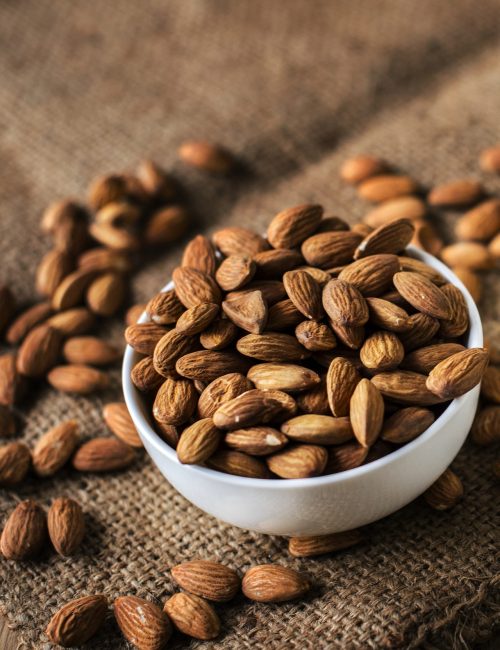Magnesium is an essential macromineral and is responsible for hundreds of enzymatic reactions that influence just about every bodily process. Sixty-Five percent is stored in bones and teeth, which become a reservoir in times of need. The remaining magnesium migrates into muscles and organs. It is necessary for muscle relaxation, neuromuscular activity, and protein synthesis.
Magnesium is found in the earth’s crust and a variety of foods. In general, the foods that contain the highest magnesium are green leafy vegetables, raw cacao, nuts, and seeds.
Hemp seeds 50% Daily Value per 1 oz.
Spinach 39% DV per cup cooked
Pumpkin Seeds 39% DV per 1 oz.
Swiss Chard 38% DV per cup
Brazil Nuts 27% DV per 1 oz.
Kale 19% DV per cup
Almonds 19% DV per 1 oz.
Dark Chocolate (85% Cocoa) 16% DV per 1oz.
Avocado 15% DV per avocado
Banana 10% DV per cup

Magnesium is an anti-stress mineral, natural tranquilizer and relaxant of skeletal muscle and smooth muscle of blood vessels and the GI tract. It is important to balance with calcium, phosphorus, potassium and sodium chloride (low magnesium causes more calcium to flow into vascular muscle cells, contracts them (tighter vessels), which leads to higher blood pressure. Calcium and magnesium balance are important, it is usually suggested when people supplement with calcium that they take half that amount in magnesium. Magnesium should also be increased when more phosphorus, vitamin D, or protein is consumed.
Magnesium deficiency is fairly common, up to half of Americans are magnesium deficient, especially those who eat processed food diets. Deficiency is due to lack of intake, or conditions that deplete the body’s magnesium reserves (alcoholism, chronic stress, kidney disorders, malabsorption syndromes (Crohn’s, celiac, gastric bypass), diabetes, medications (diuretics, antibiotics, chemotherapy).

Symptoms of magnesium deficiency include:
- Fatigue
- Loss of appetite
- Irritability
- Insomnia
- Nausea & vomiting
- Muscle tremors
- Twitching
- Confusion
- Poor memory
- Abnormal Heart Rhythm
- Numbness
- Tingling
- Diabetes
Magnesium toxicity is not common. Excess magnesium is eliminated in the urine and feces. Excessive supplementation can lead to diarrhea or upset stomach. High doses of calcium or zinc can decrease magnesium absorption, take them separately. Check with your pharmacist or doctor before taking magnesium for drug interactions with magnesium.
Conditions that Magnesium supplementation can support:
- Asthma- Supports better airway function and can reduce bronchoconstriction.
- Diabetes- Supplementation may reduce risk of type 2 and prediabetes
- Hearing loss – A small study showed some benefit.
- Kidney stones -If stones contain calcium, take magnesium oxide which increases calcium solubility in urine and can prevent calcium oxalate stones.
- Migraines & headaches– Magnesium promotes healthy nerve-cell and blood vessel function.
- Tension headache – Magnesium has the ability to relax muscles.
- PMS – Magnesium reduces water retention, breast tenderness, mood symptoms, menstrual cramps, muscle aches, anxiety, irritability, and fatigue. Magnesium is often at its lowest during menstruation.
- Constipation – Magnesium can be used short term as a natural laxative. Try milk of magnesia.
- Heart health– Magnesium is great for overall heart function. It improves blood flow (oxygen) to the heart, relieves angina, reduces palpitations, and reduces arrhythmias.
- Hypertension- Magnesium has a mild blood pressure lowering effect.
- Fibromyalgia– Magnesium reduces pain, tenderness and assists in production of cellular energy.
- Insomnia – Magnesium relaxes muscles. Take magnesium before bed to sleep better.
- Fatigue- Magnesium helps restore normal energy levels.
- Stress – Magnesium calms the nervous system.
Different forms of magnesium are:
- Magnesium Chelate- high level of absorbability.
- Magnesium Citrate- may have laxative effect.
- Magnesium Glycinate- high level of absorbability. Gentle on the stomach, less likely to cause laxative effect.
- Magnesium Chloride Oil- applied to the skin. Also great for people who have digestive disorders.
- Magnesium Threonate- has the unique ability to permeate the brain and penetrate cell membranes. High level of absorbability.
- Magnesium Orotate- contains orotic acid, used for the treatment of extracellular magnesium deficiency.
- Magnesium Oxide- poorly absorbed, relatively ineffective in correcting magnesium deficiency.
- Magnesium hydroxide- treats constipation, upset stomach, and heartburn. Known as Milk of Magnesia.
Dosages vary depending on the person and use. Please contact your pharmacist or doctor for the right dosage for you.
Include foods high in magnesium at every meal to raise your magnesium levels. Magnesium gel or sprays are great for sore muscles and to apply before bed to help you sleep. They are also great for individuals with digestive issues. For a relaxing day of self-care try an Epsom salt bath. Talk to your doctor or pharmacist today to see if taking magnesium is right for you.
Farmacy Counter’s recommended magnesium supplements are below. Click the image or the link to be directed to Amazon. Also visit our store for more recommendations.
Food high in magnesium
For Magnesium Deficiency
Magnesium GEL
For Magnesium Deficiency, sleep, relaxation
For constipation, antacid
Food high in magnesium and protein, great for smoothies
Food high in magnesium and great for snacks on the go
Food high in magnesium and selenium
Food high in magnesium and great for snacks
Food high in magnesium and great for snacks on the go
Food high in magnesium and great for baking
Dark chocolate and bananas are high in magnesium
Organic Chocolate Bar with Almonds
Dark chocolate and almonds are high in magnesium



















